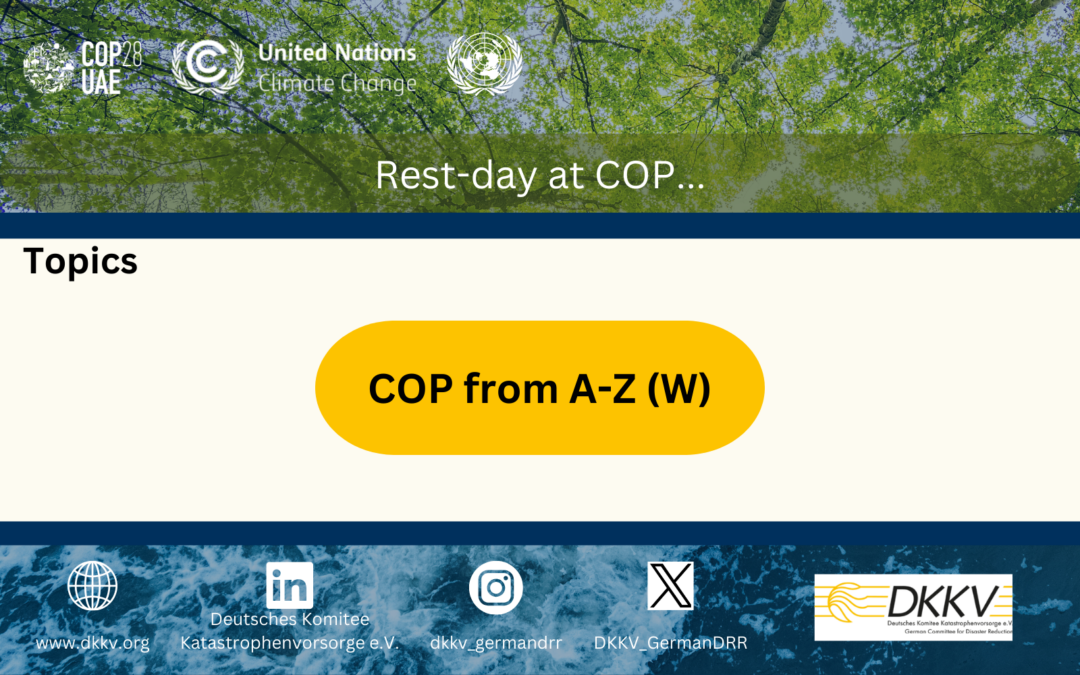Adaptation: Adaptation is the process of adapting to the effects of climate change.
BECCS: “Bioenergy with Carbon Capture and Storage” is the process of extracting bioenergy from biomass and capturing and storing the carbon, thereby removing it from the atmosphere, to lower CO2 concentrations.
CBDR: “Common but differentiated responsibilities and respective capabilities”, is a principle that refers to the issue of equity within a goal of universality: all countries must take action for GHG reduction, but historically caused emissions and current wealth and resource availability must be taken into consideration.
CCS: “Carbon Capture and Storage” extracted from the atmosphere to lower GHG concentrations.
Emission phaseout: Refers to the reduction of fossil emission mainly through CCS, the capture of carbon underground, but does not address the end of fossil fuels.
Early Warning Systems For All Initiative: This initiative is to ensure that everyone on Earth is protected from hazardous weather, water, or climate events through life-saving early warning systems by the end of 2027.
Fossil Fuel Phaseout and phase down: Phase-out is to finally set an end to fossil fuels (endgültiger Ausstieg). A phase-down on the other hand merely describes the reduction of fossil fuel use.
GST: „Global Stocktake“ or „Globale Bestandsaufnahme” assesses every country´s contribution towards meeting the Paris Agreement. This assessment is supposed to build the foundation for more ambitious NDCs.
HAC: The “High Ambition Coalition” is an informal group of countries founded in 2014 that see themselves as pioneers in climate protection. When it was founded, it focused heavily on the Paris Climate Agreement, which did not yet exist at the time, and was instrumental in establishing the 1.5 degree target. Germany is theoretically part of this group, but has not signed the last two statements.
ITMOs: “Internationally transferred mitigation outcomes” describes a co-operative approach for international collaboration that, according to Article 6 of the Paris Agreement, is supposed to increases ambition and promote sustainable development.
Klimaklub: Founded in 2022 by the G7 states under the German presidency for a coalition of states on carbon pricing to enable a contribution to ambition without distorting competition and to establish decarbonized industrial production as the global norm.
LDF: Losses and Damages by climate impacts are calculated to amount for $435 billion for 2020 and $ 580 billion for 2030. Since countries in the global South, developing countries and marginalized groups are being disproportionately affected by the climate crisis, the Loss and Damage Fund (LDF) shall support the most vulnerable and affected countries to make up for the losses and damages they have already experienced.
Mitigation: Means reducing climate change for instance by decreasing the flow of heat-trapping greenhouse gases into the atmosphere.
NDCs: “Nationally determined contributions” are the heart of the Paris Agreement to achieve its long-term goals, since they embody efforts by each country to reduce national emissions and adapt to the impacts of climate change.
Sultan Ahmed Al Jaber: Al Jaber is this year´s COP president. Since 2006 he has been chair of a sustainable energy company. However, in addition he is minister for industry and progressive technology as well as manager of the national oil company ADNOC.
UNFCCC: “United Nations Framework Convention on Climate Change” is an international environment treaty, signed by 154 states, to combat “dangerous human interference with the climate system”. The original secretariat is located in Bonn since 1996.
World Climate Action Summit: Was a side-event at this year´s COP. Its main aim was to mobilise stakeholders on different levels, regional and national, for ambitious climate action.
Quellen: NASA, UNFCCC, UN, UBA, Fridays For Future, Auswärtiges Amt


